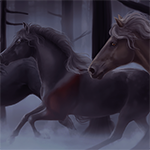
Violet and violent, they should show on her skin, all of the bruises and the jagged ruptures of festering wounds that crawl across her insides like trails on maps.
She should be ugly with injury, not gold but red, and behind her she should drag bloodied, severed tendons instead of just regret – because it hurts, because it aches wanting something so untouchable so badly and knowing it will ruin you, because it should show like fractured bones, like infection. It feels like infection.
She should be huddled and shivering, more scabs than skin, all jutting hips and angled bones wound taut by a canopy of dying skin. The lines of her face should be hard; they should hide her youth behind accumulated layers of wrong decisions. She should become home to crooked lines that will wind red through her extremities and along the edges of her veins – because she is an addict, because she cannot quit, because here they are, again and again, cheek-to-cheek, over and over.
Because here they will be, again and again, cheek-to-cheek, over and over, until one of them is dead.
Because they love like addicts love fixes.
Because they love like heroin.
Because again and again they say goodbye, and again and again neither moves to leave. She will not leave. She cannot leave. Her legs are lead and stuck fast. Her legs are anchors. Her legs are ancient trees with roots dug deep. Cordis moves first (“I’m sorry,” she says, like it’s enough – it almost is, but Spyndle cannot bring herself to say so), and her own cheek moves to follow.
Gravity.
Addiction.
And she should drink the cadence of her voice like wine; it could be warm in her throat, could heat her to her bones, if she would let it. She almost does. She almost closes her eyes against the tops of her cheeks and remembers to breathe. She almost wavers, teetering under the weight of her once lovers lips. She almost does. She almost melts against her skin like a candle into wax. But she cannot let herself.
“Perse is alive, Spyndle.”
And instead another moment finds her.
Instead, there is this second moment where she finds her footing and her nerve. Instead, she finds the fire and the spit. Instead, she finds the cold sweats, and the fever. Instead, she finds withdrawal.
“Is she alive? Is she alive, Cordis?”
The sentences are questions, but the words themselves are thick and sweet like honey – too heavy, too artificial. And then there is this smile, a smile that could never belong on her lips (lips that have never said “no”, lips that have never moved to bite the hand that feeds). And this sick, slanted smile looks painful and wonderful all at once, and she says: “As alive as you are? Alive, but just barely. Alive, but afraid of the shadows. Is she alive like that?”
And the skies are too dark now. There are flashes here and there as the lightening splits the clouds in halves. She should stop. She should let the noise drown out the fire she is breathing, but for so long she’s said nothing while her eyes screamed. For so long her eyes have been the loudest part of her.
“Because if that’s your definition of life, then I hope she has died. I hope He has finished with her what he never could with you, because this life is worse.””
She doesn’t mean to say the words aloud, but they’ve eaten away at the darkest pieces of her insides. The words have gnawed on her like a rat through the walls of a burning house, and they find light at last. The desperation sickens her instantly, but she had wanted the world for the children they made. She had wanted them to know sunsets and rivers, but stars and mountains, too. She had wanted them to touch the wildflowers with their lips. She had wanted them to be whole, and not left in fragments. She had wanted them to never see the colours of bruises, violet and violent. She had wanted them. She didn’t want them in fragments. She didn’t want them in shards.
“You are not living. You are not alive. You were forgotten in the in-between – and I should have left you there.”
spyndle
you are the prettiest thing that I will ever know

